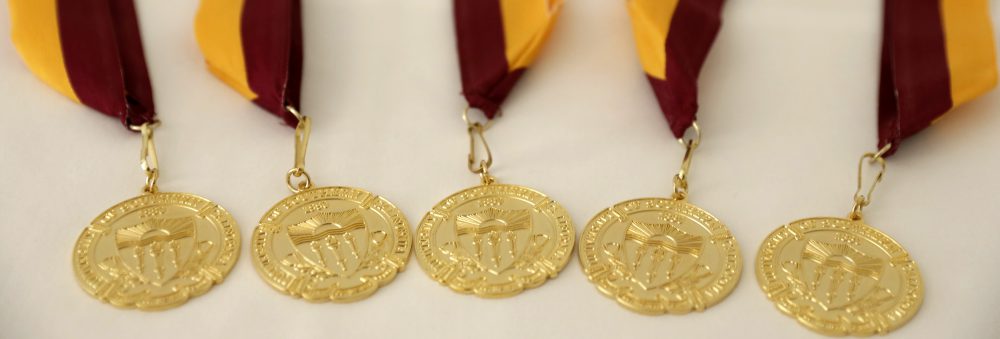by Adam Feinman
Nada Ayad is a graduate student of Comparative Literature, advised by Antonia Szabari. She is studying the literature of Egyptian revolutions of the last 100 years, including the Arab Spring revolutions in Egypt. Nada has been awarded both the Fulbright and the Josephine de Karman fellowships.
AF: How many fellowships have you applied for?
NA: Aside from the USC fellowships that departments nominate students for, I applied for eight external fellowships. I didn’t win any of them the first time, but the second time I applied I was awarded the Fulbright and Josephine de Karman fellowships.
AF: Where did you travel with the Fulbright fellowship?
NA: I was slated to travel to Egypt for my project, but my travel time was after the Arab Spring revolution when things were unstable, so the Fulbright program in Egypt was suspended.
AF: What were the other 6 fellowships you applied for? How did you find out about all these fellowships?
NA: I learned about all the fellowships I applied for by Googling keywords like “dissertation completion fellowships” and “diversity fellowships”. I applied for the Woodrow Wilson fellowship, the Ford Dissertation Completion Fellowship, the Mellon ACLS, and diversity fellowships offered by The Consortium, the AAUW, and Five Colleges.
AF: That must have been overwhelming!
NA: It gets easier the more times you apply. The first rejections were rough; it’s very difficult to avoid taking it personally.
AF: How did you move past that?
NA: I kept getting more and more advice about my graduate work and my application, and I kept editing it. The more refined my application got, the more confident I became in my ideas. Then I was able to take rejections less personally. It’s a humbling process. There are lots of good projects out there, and there are lots of excellent applications, but if you are confident in your work and persevere in applying, eventually you will win something.
AF: How did you go about getting letters of reference?
NA: My advisors know my ideas and my process so they were good letter authors for me. I also asked a faculty member not in my department. That required a new write-up of my research, but the letter author was expecting my request and I knew they would say yes. Nobody I asked was surprised by my request because I knew them all personally before applying.
AF: Besides the self-confidence you described, what else did you gain from the application process itself?
NA: Writing fellowship applications is much different than writing academic publications. The points you want to make have to be much more clear-cut and obvious. It’s very straightforward, you don’t want any subtlety or ambiguity. “I’m applying for _____ because I want ______.” So you learn how to write to different audiences. Also, I was working on all these fellowships at the same time as I was writing chapters of my dissertation, so I had to be quite careful with how I prioritized my time. Even though I was describing the same project in all my applications, each fellowship required its own essays. It’s really time consuming writing those essays and going through multiple revisions, especially since it’s quite a different writing style, so I had to be careful to make sure I was both writing my dissertation and making progress on my fellowship applications.
AF: Do you think there was any qualitative difference in the applications you wrote that won fellowships?
NA: Mostly my self-confidence and amount of time invested, so the second round of applications I wrote were better than the first. My project was more developed and I had a specific argument. That specificity made a big difference. I also had more opportunity to take advantage of resources to help me write better applications. The Fulbright office had lots of winning applications on file to look through, and they arranged for professors to help me work my Fulbright application. The Graduate School also offers one-on-one review of your applications by humanities professors outside my field. The professors then sit with you and help you edit your application. It was quite scary to do that with someone you don’t know, but even though I didn’t win that particular fellowship, the process was extremely helpful. Going through the process of having the Graduate School and experts in the fellowships walk you through things helps demystify the application process and provides positive feedback and validation about the work that you’re doing.
AF: What did you gain through the fellowship you won?
NA: Graduate school can be a very arduous experience, especially with funding concerns and teaching taking up your time. It feels very luxurious to have peace of mind, to be able to dedicate my time to my research, and to have some time to breathe between drafts, as well as time to apply for jobs. The extra time has helped me understand my own writing process in a way I couldn’t achieve when I felt rushed.
AF: Do you have any specific advice about the fellowships you won?
NA: You have to know what is unique about yourself when you apply for fellowships. The fellowship offices USC has (the Graduate School, Fulbright, etc.) have lots of resources for you, such as winning fellowships, info sessions, and a “Graduate Students’ Advocate” (GSA) for fellowships. The Internet also has lots of great resources. Take advantage of all of these resources!!! Also, take advantage of anyone who says they’ll read your essays, particularly if they know your work.
